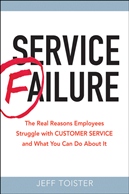Is it time to get rid of annual performance reviews?
 Jeff Toister
Jeff Toister  Monday, March 14, 2011 at 3:58PM |
Monday, March 14, 2011 at 3:58PM |  Employee performance reviews are an annual tradition in many companies, but I don’t know anyone who looks forward to it. Employees are often surprised and frustrated by the contents of their evaluation. Managers spend countless hours writing reviews only to experience the added stress of dealing with demotivated employees. Human Resources professionals struggle to keep the whole process moving forward while getting bombarded with complaints from managers and employees alike.
Employee performance reviews are an annual tradition in many companies, but I don’t know anyone who looks forward to it. Employees are often surprised and frustrated by the contents of their evaluation. Managers spend countless hours writing reviews only to experience the added stress of dealing with demotivated employees. Human Resources professionals struggle to keep the whole process moving forward while getting bombarded with complaints from managers and employees alike.
Why do we keep doing annual reviews if nobody’s happy?
I recently posed this question to a group of my human resources colleagues. The universal sentiment was that annual performance reviews could be extremely valuable if done right. Otherwise, they become a huge drain on time, resources, and employee motivation.
It turns out that “done right” is a very big IF. A 2010 study by Sibson Consulting, Inc. and World at Work revealed that 58% of human resources executives give their performance review process a “C” grade or worse. I doubt many executives would keep a manufacturing plant, a product line, or a company division that performed at a “C” level or worse year after year. How do performance reviews manage to stick around?
The promise is clearly there. Performance reviews can help determine who gets a raise and how much. They can help companies pinpoint opportunities for individual, team, or organizational development. The evaluation process can be used to help employees set goals for the coming year. Reviews can even provide solid evidence for handling performance problems.
To quote sports personality Jim Rome, "Give me an A or give me an F." My suggestion to organizations is to make a clear and unambiguous decision. Either commit to strengthening the annual review process so it achieves organizational, managerial, and employee objectives or scrap it all together.
Note: Toister Performance Solutions offers training and consulting services to help clients make the most of their employee evaluation process. Please drop us a line if you'd like to go for an A.




Reader Comments (2)
Your points are - as always! - well taken and very valid.
I think there are a couple of things you haven't mentioned, though.
First is that performance reviews serve a strong CYA role.
In other words, when there are performance reviews in place, even if they're getting a C grade, they provide structure and a fallback position in the event of general layoffs and/or needing to fire a specific employee.
I suppose it's sad, but it's nonetheless true that companies really do have to protect themselves from wrongful-termination lawsuits. Of course, sometimes those lawsuits are fully justified ... and at the same time, performance reviews do provide some protection, and backup documentation in the event someone does sue.
On the flip side, I've worked with clients in my executive coaching role who were employed by companies that had no performance review process. Without fail, these people felt unsure of their position in the company, frustrated by not having any direction as to how to improve (even poor direction is at least some direction!), and demeaned and infuriated by having no formal structure for receiving recognition and raises. In these cases, the lack of a performance review process also meant that there was no defined HR process for evaluating fair pay, either across the organization as a whole, or across the industry and/or position my clients filled.
None of this is any excuse for a performance system that gets only a C grade. But it's all strong reasons for having a performance review system ... even if it gets only a C grade.
Thanks for your comments, Grace.
A performance review can certainly help companies cover their, ahem, assets. Unfortunately, this is also another situation where a "C" review process can hurt. Here are two examples I've seen many times.
Example 1: Individual performance is poorly documented. If the review is a more of a rubber stamp and doesn't document an employee's declining performance, it can actually make it harder for a company to cover themselves if they take action.
Example 2: Laying off the wrong people. I have spoken with many HR professionals who had to manage layoffs in the past few years. Those companies with reviews that didn't differentiate between good and poor performers couldn't easily use employee performance as a basis for layoffs. They were stuck trying to manage "quotas" of protected classes and sometimes had to let good people go.